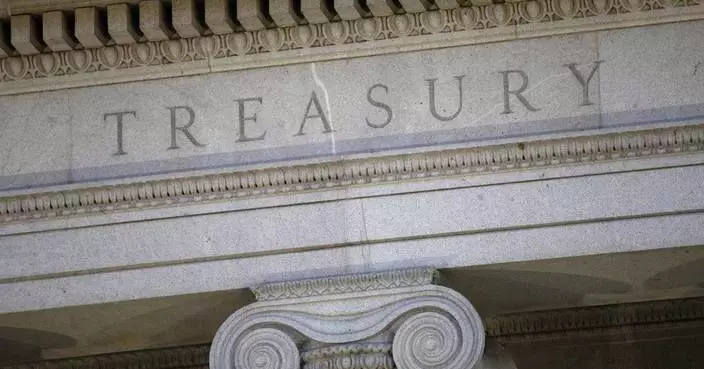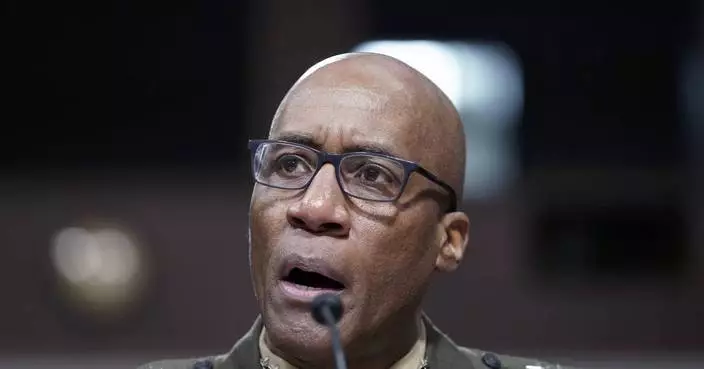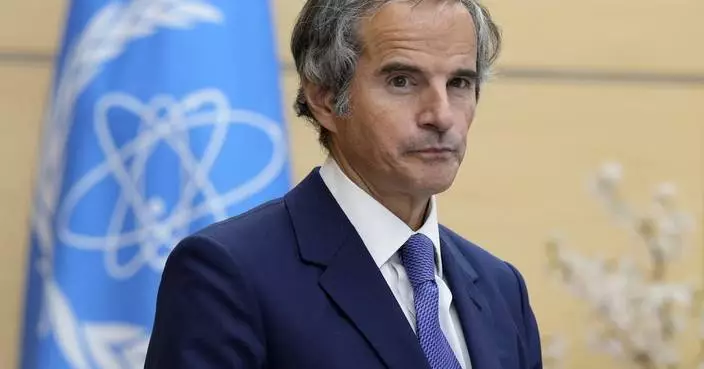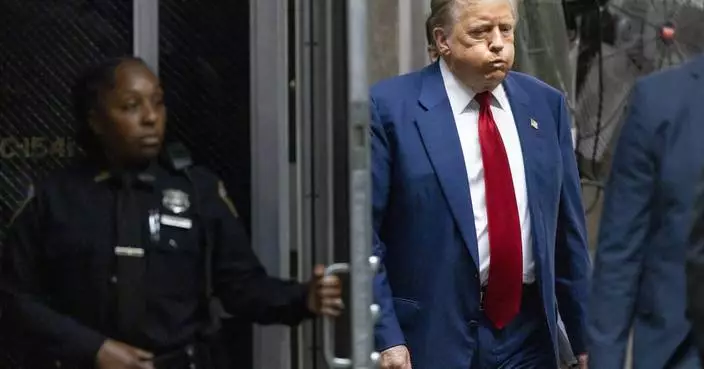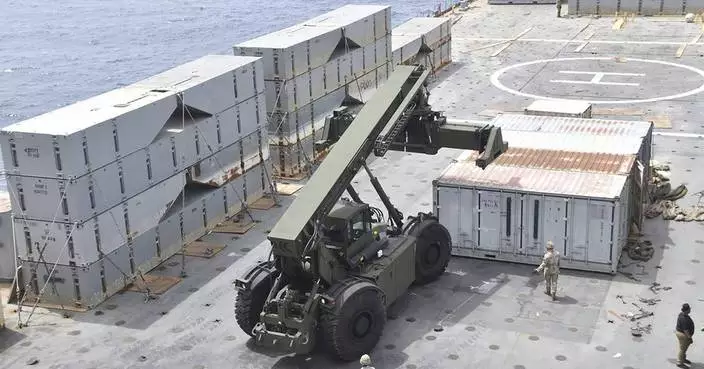Actor Anthony Rapp said he came forward with sexual misconduct allegations against Kevin Spacey because he feared assaults could "keep happening" if he said nothing.
The younger actor spoke about the incident on the red carpet for the second season of his streaming series, "Star Trek Discovery" on Thursday in New York. He said he hoped he did his part to "change the culture."
In 2017, Rapp alleged that Spacey made an unwanted sexual advance during a house party in 1986 when he was 14 and Spacey was 26. Rapp sought legal counsel at the time, but no charges were filed.
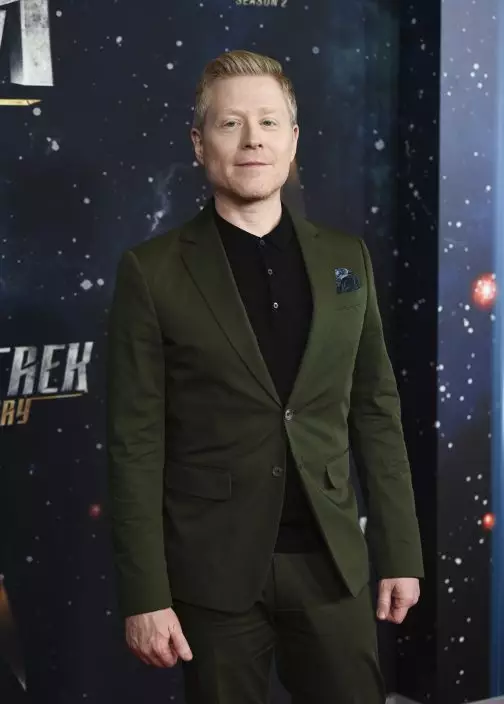
Actor Anthony Rapp attends the "Star Trek: Discovery" season two premiere at the Conrad New York on Thursday, Jan. 17, 2019, in New York. (Photo by Evan AgostiniInvisionAP)
The incident was dormant until a flurry of sexual misconduct allegations surfaced about Harvey Weinstein, prompting Rapp to come forward. Spacey responded that he did not remember such an encounter but apologized if the allegations were true.
More than year later, Rapp is proud of the decision to tell his story. "I know that it's something that needs continued movement forward and I'm going to keep doing my best to be a part of the movement forward," Rapp said.
"I was just concerned that that it would be something that could keep happening, so if I could do something that could make a difference, I was eager to."
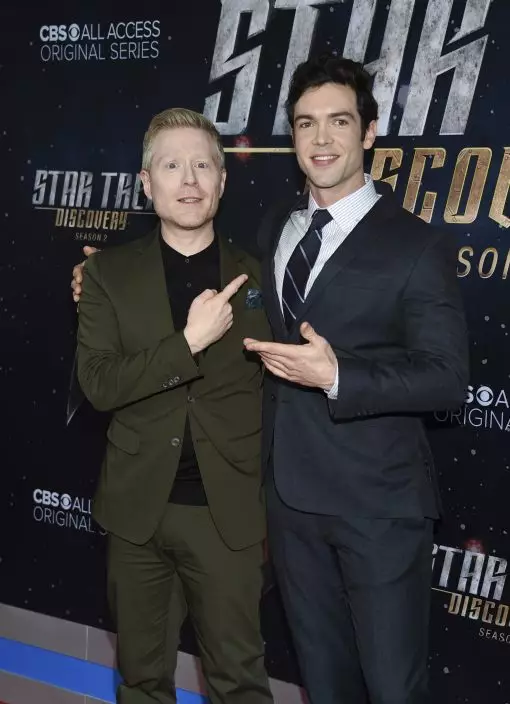
Actors Anthony Rapp, left, and Ethan Peck pose together at the "Star Trek: Discovery" season two premiere at the Conrad New York on Thursday, Jan. 17, 2019, in New York. (Photo by Evan AgostiniInvisionAP)
His "Star Trek Discovery" co-star Wilson Cruz said Rapp was being humble.
"What he did was incredibly brave, and he really allowed countless men to be able to tell their stories. You know, for the most part we were hearing stories about women and those are important stories to tell," Cruz said. "But there's a lot of stigma around abused men, sexually abused men and sexual harassment of men, and it was going to take a brave person to be able to start that conversation."
More than a dozen accusers came forward after Rapp's allegations, causing Spacey to lose his starring role on the Netflix series "House of Cards."
Earlier this month, Spacey was arraigned on felony indecent assault and battery charges after a Massachusetts man alleged that he was assaulted inside a Nantucket bar in July 2016. He was 18 years old at the time.
Follow John Carucci at http://www.twitter.com/jacarucci
UNITED NATIONS (AP) — Russia has circulated a U.N. resolution calling on all countries to take urgent action to prevent putting weapons in outer space “for all time” a week after it vetoed a U.S.-Japan resolution to stop an arms race in space.
The Russian draft resolution, obtained Wednesday by The Associated Press, goes further than the U.S.-Japan proposal, not only calling for efforts to stop weapons from being deployed in outer space but for preventing “the threat or use of force in outer space,” also “for all time.”
It says this should include deploying weapons “from space against Earth, and from Earth against objects in outer space.”
Russia’s U.N. Ambassador Vassily Nebenzia told the Security Council when he vetoed the U,S.-Japan draft that it didn’t go far enough in banning all types of weapons in space.
The vetoed resolution focused solely on weapons of mass destruction including nuclear arms, and made no mention of other weapons in space.
It would have called on all countries not to develop or deploy nuclear arms or other weapons of mass destruction in space, as banned under a 1967 international treaty that the U.S. and Russia ratified, and to agree to the need to verify compliance.
Before the U.S.-Japan resolution was put to a vote on April 24, Russia and China proposed an amendment that would call on all countries, especially those with space capabilities, “to prevent for all time the placement of weapons in outer space, and the threat of use of force in outer spaces.”
The vote was 7 countries in favor, 7 against, and one abstention and the amendment was defeated because it failed to get the minimum 9 “yes” votes in the 15-member Security Council required for adoption.
U.S. Ambassador Linda Thomas-Greenfield told the council after the vote that Russian President Vladimir Putin has said Moscow has no intention of deploying nuclear weapons in space.
“Today’s veto begs the question: Why? Why, if you are following the rules, would you not support a resolution that reaffirms them? What could you possibly be hiding,” she asked. “It’s baffling. And it’s a shame.”
Putin was responding to White House confirmation in February that Russia has obtained a “troubling” anti-satellite weapon capability, although such a weapon is not operational yet.
Russia’s U.N. Ambassador Vassily Nebenzia said after casting the veto that the U.S.-Japan resolution cherry picked weapons of mass destruction.
He said much of the U.S. and Japan’s actions become clear “if we recall that the U.S. and their allies announced some time ago plans to place weapons … in outer space.”
Nebenzia also accused the U.S. of blocking a Russian-Chinese proposal since 2008 for a treaty against putting weapons in outer space.
Thomas-Greenfield accused Russia of undermining global treaties to prevent the spread of nuclear weapons, irresponsibly invoking “dangerous nuclear rhetoric,” walking away from several of its arms control obligations, and refusing to engage “in substantive discussions around arms control or risk reduction.”
Much of the Russian draft resolution is exactly the same as the U.S.-Japan draft, including the language on preventing an arms race in space.
It calls on all countries, especially those with major space capabilities, “to contribute actively to the objective of the peaceful use of outer space and of the prevention of an arms race in outer space.”
Thomas-Greenfield said the world is just beginning to understand “the catastrophic ramifications of a nuclear explosion in space.”

FILE - U.S. Ambassador to United Nations Linda Thomas-Greenfield speaks on Thursday, April 18, 2024, in Tokyo. The U.N. Security Council is set to vote Wednesday, April 24, 2024, on a resolution announced by Thomas-Greenfield, calling on all nations to prevent a dangerous nuclear arms race in outer space. It is likely to be vetoed by Russia. (AP Photo/Eugene Hoshiko, Pool, File)






